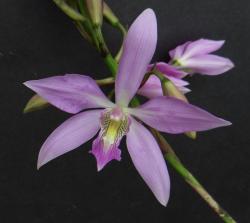There seems to be a lot of confusion when it comes to orchid names and orchid naming so I thought we should gather all of the questions and answers together to see if we could sort it out. I will use examples freely to illustrate the rules. I don’t know everything so I may say something that isn’t right. Please feel free to correct me as this is above all a place to learn.
The first term in an orchid name is the genus (genera is plural). It is always capitalized and may be abbreviated. Since there are more orchids than any other plant in the plant kingdom, there are many genera (somewhere around 1000). Then there are the intergenerics - the man-made genera that are the results of crosses of plants from different genera - sometime more than 2 genera are involved.
For example, Cattleya is a genus. If they cross a Brassavola (another genus) with a Cattleya, it is called Brassocattleya and can be abbreviated Bc. Now if they throw another genus into the mix, such as a Laelia, it becomes a Brassolaeliocattleya and is abbreviated Blc. Please note that a Blc. is still considered a genus so it's still the first term in a name and is still capitalized.
If you should run across an abbreviation that you are unfamiliar with, you can look it up on this website which is alphabetized by abbreviation:
https://www.rhs.org.uk/plants/...
Now the boffins like to play and they may throw a fourth, fifth or even a sixth genus into the mix. It is obvious that you can’t continue to stack the names end to end so we have the “ara” words. So, if you have four or more genera combined into a single genus, they use a word, usually a name, and add “ara”. For example, Fergusonara is Brassavola X Cattleya X Laelia X Schomburgkia X Sophronitis. Most of us have heard of Potinara which is Brassavola X Cattleya X Laelia X Sophronitis. Just know that when your genus name ends in an “ara” there are lots of genera that have gone into the plants make-up.
As most of us know, the boffins have made many genera name changes in the past couple of years. So when I see a name like Potinara, which is made up of many genera, I can pretty well assume that one or more of those genus names have changed which will change the Potinra name. It is kind of like the domino effect. For example, Brassavola digbyana was used over and over to cross with other orchids to make new hybrids. When they changed it to be Rhyncholaelia digbyana, all of the offspring had to change as well. So many of the Blc. orchids became Rlc. Orchids.
All of the orchids I have mentioned so far have been in the Cattley alliance. An alliance is a closely related group of orchids which can be interbred. Thus, the Brassavolas and Cattleys are in the same alliance. You have never heard of a Dendrobium/Cattleya hybrid because they are in different alliances.
You may be surprised to know that the genus Bulbophyllum is the largest with over 2000 species.
Now take a look at the second name of your orchid. If it begins with a lower case letter, the orchid is a species, which means it occurs naturally in nature. So, Cattleya skinneri. is a species orchid. If the second name starts with a capital letter, it is a hybrid. So, Cymbidium Valley League is a hybrid orchid. If there is an x written between the genus and the second name, it is a naturally occurring hybrid and is considered a species. Thus it will begin in a lower case letter. Thus, Dendrobium x delicatum is a naturally occurring hybrid.
I’m getting tired and will get back to this but first I want to answer what seemed like a question from Patty. Offspring of hybridized plants are called Grex. So, that nice little Phal I posted the other day read Phalaenopsis Little Gem Stripes (Phalaenopsis Taisuco Stripe x Phalaenopsis Taisuco Gem). Both parents listed here are hybrids as you can see by the capital letters in the second term of their names. That makes Phal. Little Gem Stripes a Grex.
I hope this helped someone and we will continue soon.
Jim

